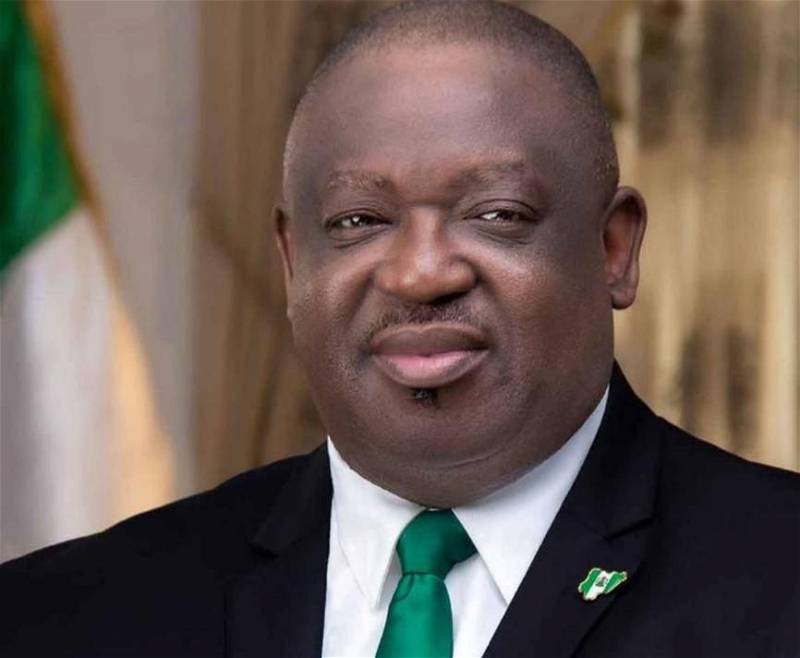In continuation of the Executive/Legislative engagement on critical plans and activities of government, the Minister of Budget and National Planning, Senator Udoma Udo Udoma on Wednesday evening briefed a joint session of the National Assembly leadership on the Economic recovery focus labs which kicks off in Abuja, next month.
The Minister explained that the focus labs are aimed at driving the critical sectors of the economy to achieve the strategic objectives of the ERGP which are restoring economic growth, investing in the people and building a globally competitive economy.
He explained that it was because of government’s determination to actualize the strategic objectives of the major enabling sectors of the ERGP that it decided to set up the focus labs with a view to unlocking investment potentials that are being stalled due to bureaucratic bottlenecks; and in the process, fast track the projects to enable investors mobilise their investments.
The labs therefore are aimed at fast-tracking attainment of the set objectives and to deliver quick and fast results to the citizens, by identifying actionable projects and removing roadblocks that has been impeding their implementation.
Senator Udoma told the legislators that since government alone cannot shoulder the provision of critical infrastructure and provide investment capital needed to drive the process, it has decided to not just partner with the private sector for investment funds, but also make the environment attractive to investors.
To achieve its goal, he explained that Government must target its investment drive significantly at investors with the capacity to boost the economy and create jobs for Nigerians, which is why it is embarking on the labs to fashion out a strategic direction and then conduct a mass crowd sourcing of ideas to mobilise resources into the focused areas.
For the ERGP implementation programme, the labs would therefore provide an avenue to further drill down government’s economic recovery efforts in the initial focused areas of Agriculture and Transportation, Manufacturing and Processing, and Power and Gas.
The labs will also identify catalytic Entry Point Projects (EPPs) that would mobilise private investment projects to spearhead investment and job creation in the specific sectors, and drive the economy towards achieving the ERGP targets by 2020, he added.
The three main objectives of the labs are mobilizing new investments for critical projects, resolution of complex inter-agency problems that inhibit private sector investment and job creation for Nigerians. The labs are being executed in three phases: Pre-lab January, 15 to March 4; Main lab, March 5 to April 15 and Post lab, April 15 to May 13, 2018.
The Minister pointed to the positive trends already being generated in the economy by the initiatives and reforms of government, which he said started manifesting in 2017, and which indicate that the initiatives are working. Specifically, he noted that the GDP has returned to a positive growth path while performance of other macro indicators is also encouraging indicating that confidence has started coming back: Capital importation is improving, Foreign Reserves are growing, Inflation rate is declining and the Exchange rate gap is narrowing.
He said Government is working tirelessly to create a better environment for doing business. Part of such efforts was the setting up of the Presidential Enabling Business Environment Council (PEBEC), which set for itself a target of moving 20 places up the World Bank Ease of Doing Business ladder. That effort yielded result last year when the country surpassed the target of 20 to move 24 places in the ranking from 169 to 145.
He acknowledged that more work still needs to be done to achieve the targets set out in the ERGP, which is why the labs have become necessary to speed up the process in some critical sectors.
The Deputy Senate President, Ike Ekweremadu, who represented Senate President Bukola Saraki at the session, commended government’s move at ensuring diligent implementation of the plan, as he said government is now thinking seriously about developing the economy.
He was not comfortable with the way Nigerians de-market the country’s efforts of finding solutions to challenges through unnecessary criticism and pessimism, saying there was need to put our acts together and think patriotically.
Senator Ekweremadu noted government was encumbered by unnecessary burden arising from huge recurrent subheads because some persons have accumulated advantages that they are not prepared to give up, and suggested that some structures of government should give way and allow funds to be put to proper and more beneficial use to the people.
He called on government to ensure a conducive environment that would attract investors and specifically mentioned security architecture and power infrastructure as areas that serious attention should be given.
The Speaker of the House of Representatives, Mr Yakubu Dogara, commended the executive for the approach adopted in ensuring that the objectives of the ERGP are realized but wants government to do something about the interest rate regime as Nigerians may be unable to effectively participate in the investment programme because of funding constraints.
The head of the Malaysian Performance Management Delivery Unit (PEMANDU), Dr Idris Jala, briefed the leadership of the National Assembly on the Malaysian experience, and indicated that the Malaysian economic history has a lot of semblance with the Nigerian experience.
He said at a point the Malaysian economy took a downward turn and he had to warn that unless there was a fundamental way of managing the economy, the country would go bankrupt. He recommended transformational leadership at all levels, which entailed taking actions that may be painful in the short term but beneficial in the long run to the people.
He said that Malaysia also used the lab process with great success as a tool for the transformation of its economy.



